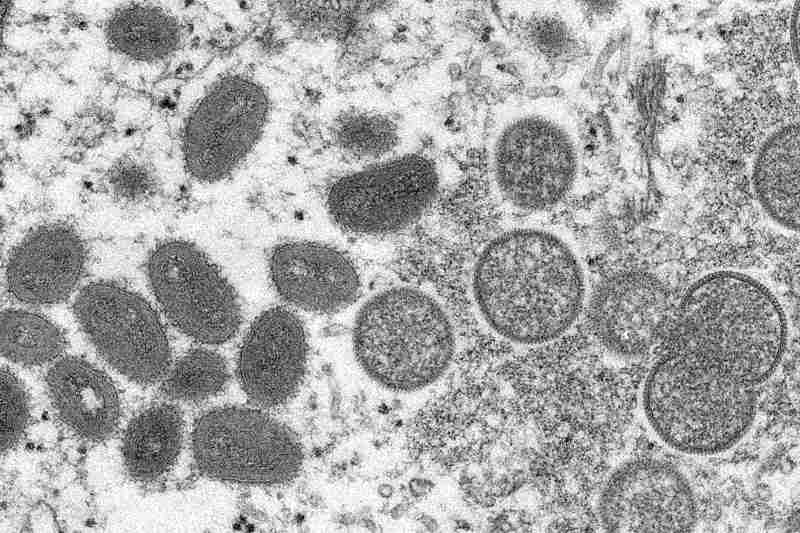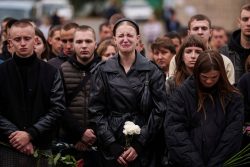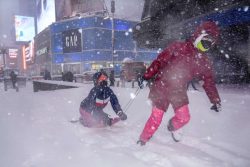
This 2003 electron microscope image made available by the Centers for Disease Control and Prevention shows mature, oval-shaped monkeypox virions, left, and spherical immature virions, right, obtained from a sample of human skin associated with the 2003 prairie dog outbreak.
9:55 JST, May 31, 2022
LONDON (AP) — The World Health Organization’s top monkeypox expert said she doesn’t expect the hundreds of cases reported to date to turn into another pandemic, but acknowledged there are still many unknowns about the disease, including how exactly it’s spreading and whether the suspension of mass smallpox immunization decades ago may somehow be speeding its transmission.
In a public session on Monday, WHO’s Dr. Rosamund Lewis said it was critical to emphasize that the vast majority of cases being seen in dozens of countries globally are in gay, bisexual or men who have sex with men, so that scientists can further study the issue. She urged those at risk to be careful.
“It’s very important to describe this because it appears to be an increase in a mode of transmission that may have been under-recognized in the past,” said Lewis.
“At the moment, we are not concerned about a global pandemic,” she said. “We are concerned that individuals may acquire this infection through high-risk exposure if they don’t have the information they need to protect themselves.”
She warned that anyone is at potential risk for the disease, regardless of their sexual orientation. Other experts have pointed out that it may be accidental that the disease was first picked up in gay and bisexual men, saying it could quickly spill over into other groups if it is not curbed.
Last week, WHO said 23 countries that haven’t previously had monkeypox have now reported more than 250 cases. On Monday, the U.K. announced another 71 monkeypox cases.
Lewis said it’s unknown whether monkeypox is being transmitted by sex or just the close contact between people engaging in sexual activity and described the threat to the general population as “low.”
Monkeypox is known to spread when there is close physical contact with an infected person, their clothing or bedsheets.
She also warned that among the current cases, there is a higher proportion of people with lesions that are more concentrated in the genital region and sometimes nearly impossible to see.
“You may have these lesions for two to four weeks (and) they may not be visible to others, but you may still be infectious,” she said.
Last week, a top adviser to WHO said the monkeypox outbreak in Europe, U.S., Israel, Australia and beyond was likely linked to sex at two recent raves in Spain and Belgium. That marks a significant departure from the disease’s typical pattern of spread in central and western Africa, where people are mainly infected by animals like wild rodents and primates.
Scientists haven’t yet determined whether the monkeypox outbreak in rich countries can be traced to Africa, but the disease continues to sicken people on the continent.
On Monday, authorities in Congo said nine people have died of monkeypox in 2022. Dr. Aime Alongo, chief of the Sankuru health division in Congo, also said 465 cases have been confirmed, making it one of the worst-hit nations in West and Central Africa.
Nigerian authorities confirmed the country’s first monkeypox death this year, in addition to six more cases. WHO says thousands of cases are reported from Nigeria and Congo every year.
Most monkeypox patients experience only fever, body aches, chills and fatigue. People with more serious illness may develop a rash and lesions on the face and hands that can spread to other parts of the body. No deaths have been reported in the current outbreak beyond Africa.
WHO’s Lewis also said while previous cases of monkeypox in central and western Africa have been relatively contained, it was not clear if people could spread monkeypox without symptoms or if the disease might be airborne, like measles or COVID-19.
Monkeypox is related to smallpox, but has milder symptoms. After smallpox was declared eradicated in 1980, countries suspended their mass immunization programs, a move that some experts believe may be helping monkeypox spread now, since there is now little widespread immunity to related diseases. Smallpox vaccines are also protective against monkeypox.
Lewis said it was also uncertain how much immunity people who were previously vaccinated against smallpox might still have, since that was at least more than four decades ago. She said WHO’s priority was to stop the current spread of monkeypox before the disease became entrenched in new regions.
“If we all react quickly and we all work together, we will be able to stop this,” she predicted. “We will be able to stop it before it reaches more vulnerable people and before it establishes itself as a replacement for smallpox.”
Top Articles in News Services
-

Survey Shows False Election Info Perceived as True
-

Hong Kong Ex-Publisher Jimmy Lai’s Sentence Raises International Outcry as China Defends It
-

Japan’s Nikkei Stock Average Touches 58,000 as Yen, Jgbs Rally on Election Fallout (UPDATE 1)
-

Japan’s Nikkei Stock Average Falls as US-Iran Tensions Unsettle Investors (UPDATE 1)
-

Trump Names Former Federal Reserve Governor Warsh as the Next Fed Chair, Replacing Powell
JN ACCESS RANKING
-

Producer Behind Pop Group XG Arrested for Cocaine Possession
-

Japan PM Takaichi’s Cabinet Resigns en Masse
-

Japan Institute to Use Domestic Commercial Optical Lattice Clock to Set Japan Standard Time
-

Man Infected with Measles Reportedly Dined at Restaurant in Tokyo Station
-

Israeli Ambassador to Japan Speaks about Japan’s Role in the Reconstruction of Gaza
























